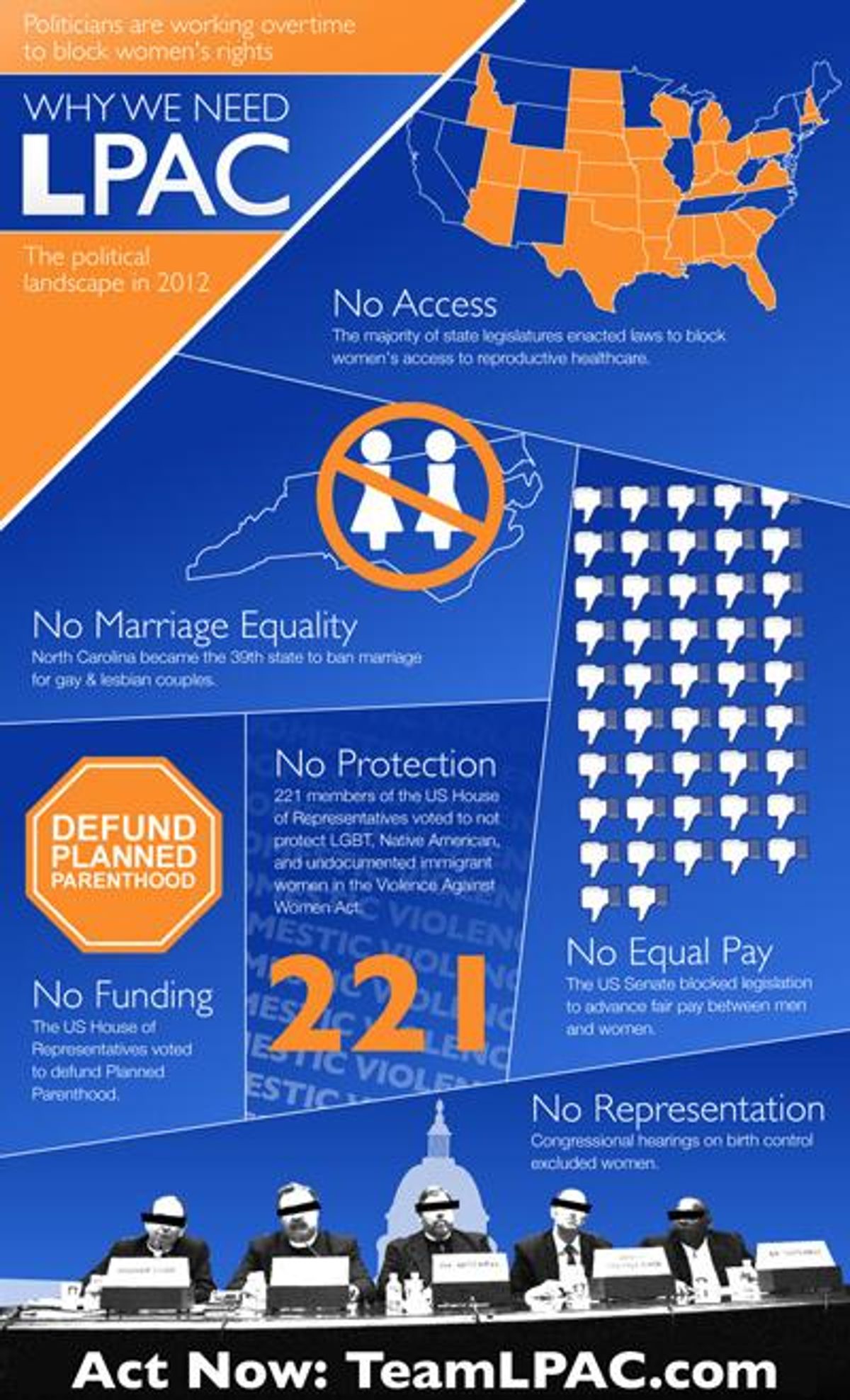Last fall, a group of high-powered women, some of whom had never met, gathered in New York City to discuss a question that has long bedeviled regulars on the fund-raising circuit: How can lesbians participate in the political process more meaningfully and be more present and visible?
"Personally, as a woman who has been engaged as a donor, I'm often in the minority when I'm in the room," said Sarah Schmidt, a Chicago-based consultant and philanthropist. "And that gets old. I think, 'Are my interests really being represented here?'"
Following the initial meeting, attendees reached out to their networks and received an enthusiastic response. More women got involved, and eventually the group started to solicit contributions.
LPAC, believed to be the first PAC focused directly on issues that affect lesbians and their families, was born. The organization launches Wednesday with a mission to support pro-women candidates this cycle and build a donor network over the longer term that connects lesbians who want to contribute but may not know where to find each other.
"A group of us felt like there was a need to create something that was ours, that uniquely represented our voices, that might give us a little more influence and a seat at the table when these issues are being discussed," said Schmidt, who serves as treasurer and chair of the LPAC advisory board, which approves all the group's expenditures and investments. Eight inaugural board members, the majority of whom identify as lesbian, hail from the worlds of politics, business and media across the country. Leaders include Urvashi Vaid, former executive director of the National Gay and Lesbian Task Force, and Chicago Cubs co-owner Laura Ricketts, a co-chair of the Democratic National Committee's LGBT Leadership Council and top bundler for President Barack Obama. Glee star Jane Lynch and tennis trailblazer Billie Jean King do not serve on the board, but they have endorsed the effort.
"This year we have seen politicians repeatedly support policies that harm women," said Lynch in a statement. "It is important to me to elect leaders who care about issues that impact women and their families. That's why I support LPAC."
Organizers said they felt galvanized not only by the backlash against women's rights this year, but also by the growing prominence of LGBT issues. The group is still deciding which candidates and causes it will support, but the four state ballot initiatives on marriage equality are under close consideration, in addition to the campaign of Rep. Tammy Baldwin, who could become the first openly gay person elected to the U.S. Senate. Schmidt said her race in Wisconsin was of "vital importance" to board members, and the slate would be finalized "within the next couple of weeks."
"If there was ever a time for lesbians to get their act together, network and engage in the political process, it's now," she said in a telephone interview. "If not now, when?"
Though aimed at lesbians, LPAC will champion issues of concern to other women and like-minded men, such as health care access, reproductive freedom, income inequality, and racial justice. Its name, the result of a brainstorming session, speaks to lesbians, but the letter L can also represent other words and concepts valued by the group, like simply, "love." However, "liberal" is not compulsory, where the group, while led by many Democratic-affiliated women, is officially bipartisan. LPAC will support candidates who share its principles regardless of sexual orientation, sex, or gender.
"I'm involved in starting LPAC because I want to create a fresh politics, one in which the lives of ordinary working women and men, LGBT people and people of color matter, and because I believe lesbians must step up and lead in solving our country's challenges," said Vaid in a statement.
The super PACs unleashed by the Supreme Court's Citizens United decision have come under blistering criticism for spending unrestricted amounts of money, often from anonymous sources. LPAC plans to disclose its donors in the interest of "real transparency," according to Schmidt.
So far, the group has received pledges of $200,000, with a goal of raising $1 million this election cycle. That amount seems modest compared to the hundreds of millions being raised by the top super PACs, but coming predominantly from lesbian donors, it would represent a milestone.
Women, who tend to be the primary caregivers for their families, face a variety of demands on their wallets and time. This year in particular, politically engaged lesbians have been absorbed in the presidential campaign. LPAC is collaborating with the Gay & Lesbian Victory Fund, which supports LGBT candidates, and Emily's List, which backs pro-choice Democratic women, in order to leverage limited resources and maximize impact.
Strictly speaking, LPAC is a "hybrid PAC," an increasingly popular entity that, like a super PAC, can raise unlimited money for independent expenditures, but also may contribute limited amounts directly to candidates, provided the operations remain separate. LPAC plans to spend the majority of its money in support of candidates, said Schmidt. The group also wants to offer women the prospect of a more permanent political community that lasts after 2012.
"We're finding a lot of women who want to be engaged beyond just a check writing or a donation," she said. "They're excited about the idea that we're really building a network of women that hopefully are engaged around these critical issues, not just throwing the money out into campaigns."
Three of the group's advisory board members - lobbyist Emily Giske, strategist Val Berlin, and pollster Donna Victoria - helped to mastermind Fight Back New York. The campaign ousted state lawmakers opposed to marriage equality using principles pioneered by Karl Rove, the former Bush advisor and co-founder of the Republican super PAC, American Crossroads. LPAC has been receiving strategic advice from Civitas Public Affairs Group, the new firm launched by Patrick Guerriero and Bill Smith, who steered Fight Back New York for the Gill Action Fund in 2010. Civitas recently hired Katherine Grainger, who served as assistant counsel to Governor Andrew Cuomo during the passage of the Marriage Equality Act.
Schmidt said that although the efforts were "very different," she admired the efficiency and effectiveness of Fight Back New York. She did not rule out the use of bare-knuckled political tactics, if that's what it takes to win.
"We feel like we're fighting for something as women," she said. "We are fighting for basic human rights and we're not going to apologize for that."

















































































